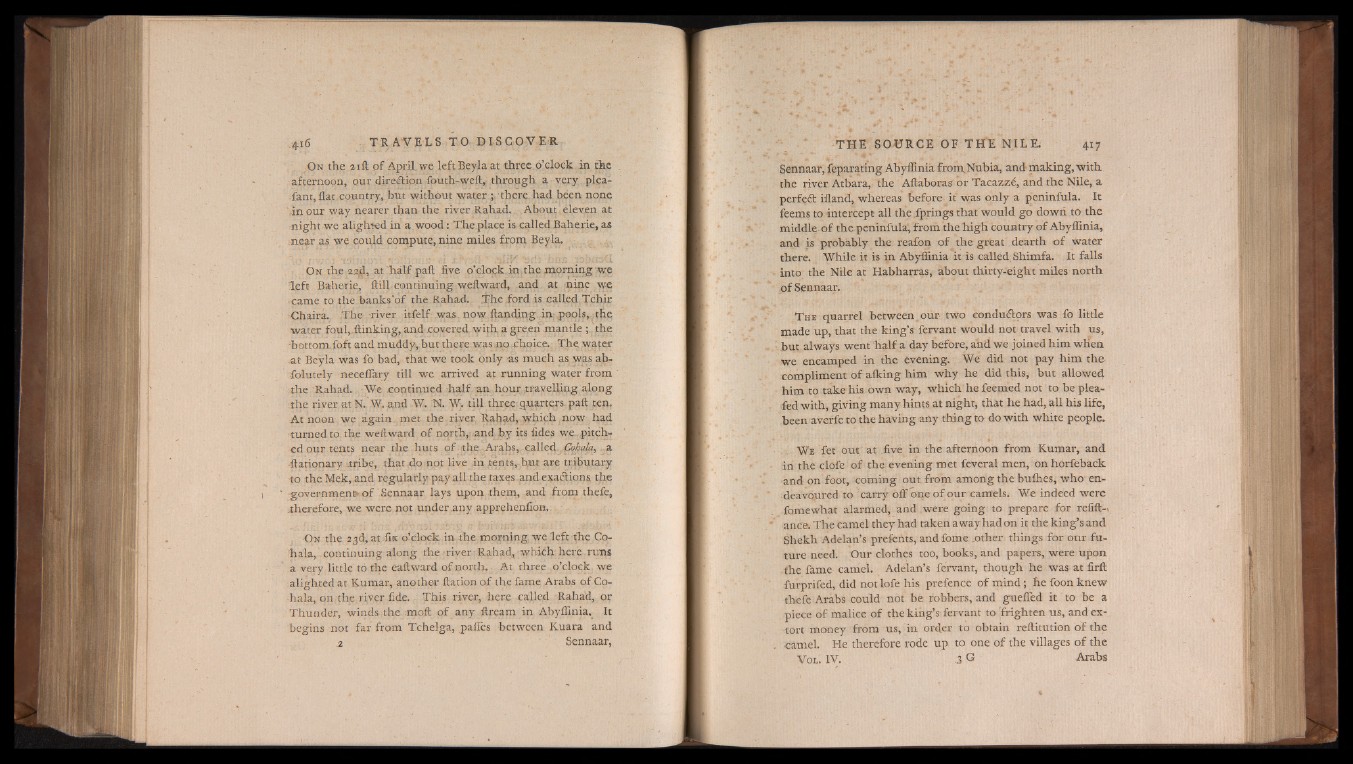
O n the 2 1 ft o f April we left Beyla at three o’clock in the
afternoon, our direction fouth-wefl^ through a very plea-
fant, flat country, but without water ; there, had been none
in our way nearer than the river Rahad. About eleven at
night we alighted in a wood : The place is called Baherie, as
near as we could compute, nine miles from Beyla.
O n the 2.2$, at h a lf paft five o’clock in the m o rn in g’w e
le f t Baherie, Hill-continuing weltward, and at nine we
|J5 came to thè banks'ò f thè Rahad. The,ford is called,Tchir
Chaira. The river itfelf was now $anding.:in; pool?,, the
water foul, ftinking, and covered with, a green mantle ; the
■bottom,foft and muddy, but there was no choice. The water
at Beyla was f° had, that we took only ;as much as was ab-
folutely necefiary till we arrived at running water from
the Rahad. We .continued half, lan hour travelling »¡long
the river at N. W. and W. IS. W. till three- quarters paft . tep.
At noon we again met the river Rahad, which now had
turned to the weftward o f north,: and by its fides we.pitch*
ed our tents near the huts o f d ie Arabs,, e a l l e d , . a
•ftationary -tribe, that-do not live in $mts, but are tributary
to the Mek, and regularly pay all the taxes and exactions the
I ' -government* o f Sennaar lays upon them, and from thefe,
-therefore, we were not under .any apprehenfion,
. On the 23d, at fix o’clock in the morning we left the Codiala,
continuing along the river-Rahad, which here runs
a very little to the eaftward o f north.. At three o’clock, we
alighted at Kumar, another ftation o f the lame Arabs o f Coltala,
on the river fide. This liver, here called Rahad, or
Thundèr, winds the moft o f any ftream in Abylfinia, It
begins not far from Tche?ga, paflTes between Kuara and
.2 ' Sennaar,
Sennaar, feparating Abylfinia from.Nubia, and making, with
the river Atbara, the Allaboras or Tacazze, and the Nile, a
perfeCt ifland, whereas before it was only a peninfula. It
feems to intercept all the Tprings that would go down to the
middle-of the peninfula, from the high country o f Abylfinia,
and is probably the reafon o f the great dearth o f water
there. While it is in Abylfinia it is called; Shimfa. It falls
into the Nile at Habharras, about thirty-eight miles north
o f Sennaar.
T he quarrel between our two conductors was fo little
made up, that the k in g ’s fervant would not travel with us,
but always went ha lf a day before, apd we joined him when
we encamped in the evening. We did not pay him the
compliment o f alking him w hy he did this, but allowed
him to take his own way, which he feenied not to be plea-
fed with, giving many hints at night, that he had, all his life,
been averfe to the having any thing to do with white people.
W e fet out; at five in the afternoon from Kumar, and
in the clofe o f the evening met feveral men, on horfeback
and on foot, coming out from among the bulhes, who endeavoured
to carry oflFone o f our camels. We indeed were
fomewhat alarmed, and were goin g to prepare for refill-,
ance. The camel they had taken away had on it the k in g ’s and
Shekh Adelan’s prefents, and fome .other things for our fu ture
need. Our clothes too, books, and papers, were upon
the fame camel. Adelan’s fervant, though he was at firft
furprifed, did notlofe his prefence o f mind; he fo o a kn ew
thefe Arabs could not be robbers, and gueffed it to be a
piece o f malice o f the k in g ’s fervant to 'frighten us, and extort
money from us, in order to obtain rellitution o f the
camel. He therefore rode up to one o f the villages o f the
V o l . IV. .3 G Arabs